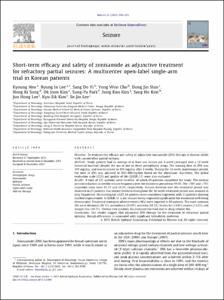Short-term efficacy and safety of zonisamide as adjunctive treatment for refractory partial seizures: A multicenter open-label single-arm trial in Korean patients
- Keimyung Author(s)
- Yi, Sang Do; Cho, Yong Won
- Department
- Dept. of Neurology (신경과학)
- Journal Title
- Seizure
- Issued Date
- 2012
- Volume
- 21
- Issue
- 3
- Keyword
- Antiepileptic drugs; Zonisamide; Epilepsy; Partial seizures; Open-label study; Add-on therapy
- Abstract
- Objective: To evaluate the efficacy and safety of adjunctive zonisamide (ZNS) therapy in Korean adults with uncontrolled partial epilepsy.
Methods: Study patients had an average of at least one seizure per 4-week (averaged over a 12-week historical baseline) despite the use of one to three antiepileptic drugs. The starting dose of ZNS was 100 mg/day, and was increased to 200 mg/day after 2 weeks. During the 12-week maintenance period, the dose of ZNS was adjusted to 200–400 mg/day based on the physicians’ discretion. The global evaluation scale (GES) and quality of life (QOLIE-31) were also evaluated.
Results: A total of 121 patients were enrolled, of which 88 patients completed the study. The median percent reduction in weekly seizure frequency over the treatment period was 59.0%. The 50% and 75% responder rates were 57.3% and 38.5%, respectively. Seizure freedom over the treatment period was observed in 25 patients, but seizure freedom throughout the 16-week treatment period was attained in only 16 patients. On investigator’s GES, 84 patients were considered improved, with 33 patients showing marked improvement. In QOLIE-31 scale, seizure worry improved significantly but emotional well-being deteriorated. Treatment-emergent adverse events (AEs) were reported in 80 patients. The most common AEs were dizziness (28.1%), somnolence (24.0%), anorexia (18.2%), headache (14.0%), nausea (13.2%), and weight loss (10.7%). Twenty-two patients discontinued the trial due to drug-related AEs.
Conclusions: Our results suggest that adjunctive ZNS therapy for the treatment of refractory partial epilepsy, though efficacious, is associated with significant tolerability problems.
- Publisher
- School of Medicine
- Citation
- Kyoung Heo et al. (2012). Short-term efficacy and safety of zonisamide as adjunctive treatment for refractory partial seizures: A multicenter open-label single-arm trial in Korean patients. Seizure, 21(3), 188–193. doi: 10.1016/j.seizure.2011.12.005
- Type
- Article
- ISSN
- 1059-1311
- Appears in Collections:
- 1. School of Medicine (의과대학) > Dept. of Neurology (신경과학)
- 파일 목록
-
-
Download
 oak-aaa-4304.pdf
기타 데이터 / 307.09 kB / Adobe PDF
oak-aaa-4304.pdf
기타 데이터 / 307.09 kB / Adobe PDF
-
Items in Repository are protected by copyright, with all rights reserved, unless otherwise indicated.